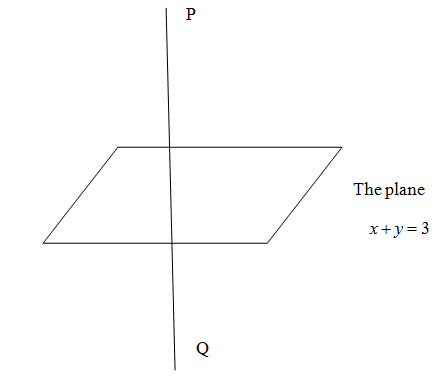Question
Question: Let \(P\) be a point in the first octant , whose image \(Q\) is in the plane (that is the line segme...
Let P be a point in the first octant , whose image Q is in the plane (that is the line segment PQ is perpendicular to the plane x+y=3 and the midpoint of PQ lies on the plane x+y=3) lies on the z-axis. Let the distance of P from x-axis be 5. If R is the image of Pin the xy-plane then what is the length of PR $$$$
Solution
Use the equation perpendicular line containing two points that are images of each other to find out the coordinate P. Then use the fact that two points that are image of each other are equidistant from the reflecting plane.$$$$
Complete step-by-step answer:

We can see from the image that the point Pis reflected onto Q by the plane x+y=3. If P is an image of Q then Q is also an image of P. Let us denote the coordinates as P(xp,yp,zp) and Q(xq,yq,zq). We know that the perpendicular line containing P and Q where P is the image of Q with respect to the plane ax+by+cz+d=0 is given by
axp−xq=byp−yq=czp−zq=−2(a2+b2+c2axq+byq+czq+d)
As given in the body of the solution that the point lies Q on the z-axis. So xp=0 and yp=0. The given equation of the plane is x+y=3. So a=1,b=1,c=0,d=−3. Putting these values in above equation
& \dfrac{{{x}_{p}}-0}{1}=\dfrac{{{y}_{p}}-0}{1}=\dfrac{{{z}_{p}}-{{z}_{q}}}{0}=-2\left( \dfrac{1\cdot 0+1\cdot 0+0{{z}_{q}}-3}{{{1}^{2}}+{{1}^{2}}+{{0}^{2}}} \right) \\\ & \Rightarrow {{x}_{p}}={{y}_{p}}=3,{{z}_{p}}={{z}_{q}} \\\ \end{aligned}$$ So the coordinates $P$ are obtained as $\left( 3,3,{{z}_{q}} \right)$. It is also given that the point $P$ is at distance 5 from $x$-axis. The distance of any point is given by the formula $d=\sqrt{{{y}^{2}}+{{z}^{2}}}$. So , $$\begin{aligned} & 5=\sqrt{{{3}^{2}}+{{z}_{q}}^{2}} \\\ & \Rightarrow {{z}_{q}}=\sqrt{{{5}^{2}}-{{3}^{2}}}=4 \\\ \end{aligned}$$ We have rejected the negative result because ${{z}_{q}}$ is a distance. Now the coordinates $P$ are obtained as $\left( 3,3,4 \right).$ We also know that the distance of any point from the $xy$-plane is equal to the $z$ coordinate of the point. So the distance $P\left( 3,3,4 \right)$ from the $xy$-plane is 4. $$$$ It is given that $R$ is the image of $P$ in $xy$-plane. Then R and $P$ are equidistant from $xy$-plane. Hence the length $PR=2\times 4=8$.$$$$ **Note:** The question tests the application distance formulas and reflection points. It is good to remember these formulas for example the point$\left( {{x}_{1}},{{y}_{1}},{{z}_{1}} \right)$ to plane $ax+by+cz+d=0$distance formula $$r=\left| \dfrac{ax+b{{y}_{1}}+c{{z}_{1}}+d}{\sqrt{{{a}^{2}}+{{b}^{2}}+{{c}^{2}}}} \right|$$ and the line perpendicular to the reflecting plane $\dfrac{{{x}_{1}}-{{x}_{2}}}{a}=\dfrac{{{y}_{1}}-{{y}_{2}}}{b}=\dfrac{{{z}_{1}}-{{z}_{2}}}{c}=-2\left( \dfrac{a{{x}_{2}}+b{{y}_{2}}+c{{z}_{2}}+d}{{{a}^{2}}+{{b}^{2}}+{{c}^{2}}} \right)$ for shorter calculation.